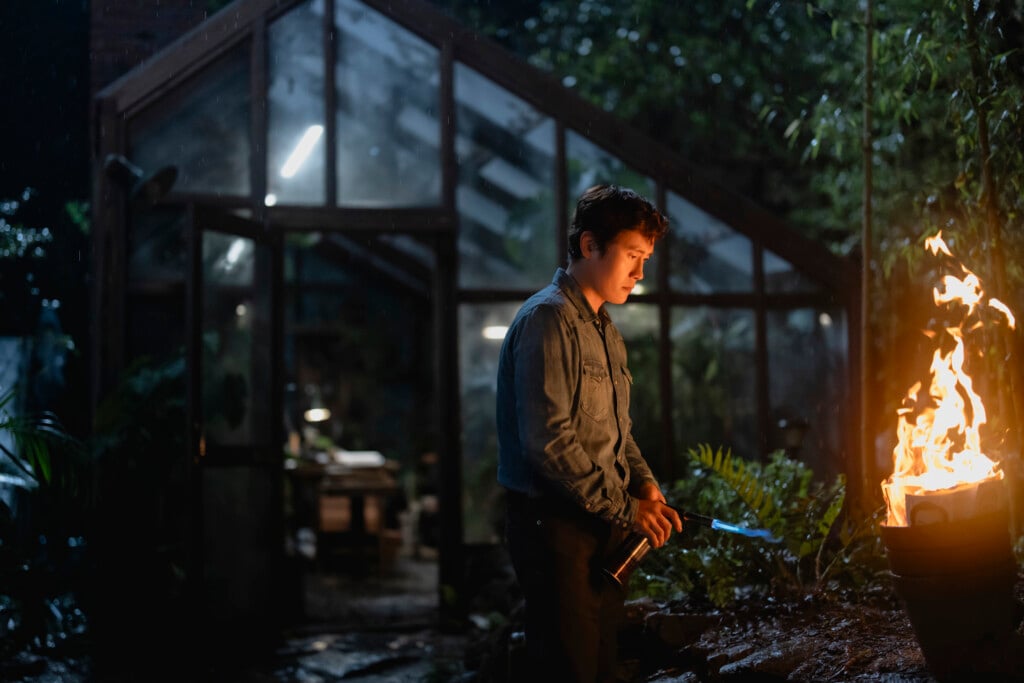Queer uses Daniel Craig for a lonely and introspective look at William S. Burroughs
You’re not supposed to like William Lee.
The main character of William S. Burroughs’ novels Junkie, Queer and Naked Lunch is a literary alter-ego for Burroughs himself. In film, the character first appeared in David Cronenberg’s adaptation of Naked Lunch, where he was played by Peter Weller. Now, in Luca Guadagnino and Justin Kuritzkes’s adaptation of Queer, he’s back again, played by Daniel Craig.
Lee, like Burroughs, is a heroin addict and an alcoholic. When we meet him, he’s hanging out in Mexico seeking out a psychedelic native plant called yage (we know it as ayahuasca). He spends his nights in bars hitting on twentysomething American kids financing their youthful adventures through GI Bill benefits and part-time jobs. Craig’s Lee is old enough to be these kids’ father. He’s sweaty, overly self-aware, awkward and desperate.
Then there’s Eugene Allerton (Drew Starkey), the object of Lee’s affection. Allerton is one of these young postwar travelers, who appears to Lee in an almost otherworldly way, walking past a late-night cockfight. Allerton is everything Lee is not: put-together, soft-spoken and physically perfect. Where Lee sweats and stumbles, Allerton glows and floats along with effortless grace. When he walks by, harps play.
No wonder Lee is obsessed.
Queer is about the search for connection, told in an appropriately Burroughsian style with surreal dream sequences, grotesque drug trips, and journeys into the self. It is not, however, a conclusive story, nor is it a healthy one. Don’t let those dreamy trailers fool you — the story of a lonely, beaten-down man who finds someone to love him for himself is the story Lee desires, but it’s not (and shouldn’t be) the one he gets.
That most of the other men Lee’s age surrounding him (Jason Schwartzman, Drew Droege, Ariel Schulman and David Lowery) are similarly sad, self-denying or self-flagellating, turns the town they’re in into a kind of purgatory — they rarely if ever interact with the natives, preferring instead to grouse to each other about whatever bad hookup they’ve just had. Guadagnino and cinematographer Sayombhu Mukdeeprom fill the frame with empty streets and sparsely peopled bars to amplify the sense of being strangely alone in a world that should be crowded.
Trent Reznor and Atticus Ross’ score similarly plays with themes of noirish bluesiness, at times straying into ethereal beauty or taking hard turns into sharp dissonance when things get really bad. It’s all an accurate reflection of Lee’s state of mind, at times deeply sad, at times longing, at times self-hating or reeling from whatever poison he’s injected or imbibed.
Lee’s possessiveness, self-mythologizing and penchant for self-destruction makes him a hard character to spend time with, especially once Allerton presents him with an outlet for those behaviors. Allerton, in turn, becomes cagey and elusive after the first couple of times they sleep together, causing a clingy Lee to invite the young man to South America on his hunt for Yage.
Allerton’s flakiness first comes off as the classic behavior of men in their twenties, but evolves into a kind of identity crisis thanks to a revelatory ayahuasca trip guided by wild woman botanist Doctor Cotter (a superbly strung-out Lesley Manville). Allerton knows what he wants, but is afraid to want it, and even more afraid to want it with a man as screwed up as Lee. On some level he may fear (not incorrectly) that if he sticks around with Lee for long enough, he’ll start to become him.
Queer is enamored with Burroughs’ writing, themes and the long tail of his artistic legacy. It’s there in the presence of Reznor and Ross, as well as incongruous needle drops from Nirvana, Prince, New Order and contemporary covers of their songs. It’s there in a visual style that’s of a piece with Cronenberg’s 1991 Naked Lunch adaptation. Guadagnino’s film is also, however, slyly critical of and curious about the man behind all of it in a way that’s off-putting at first, and increasingly interesting the more you think about it. Queer isn’t a fun film, but it is a fascinating one.






